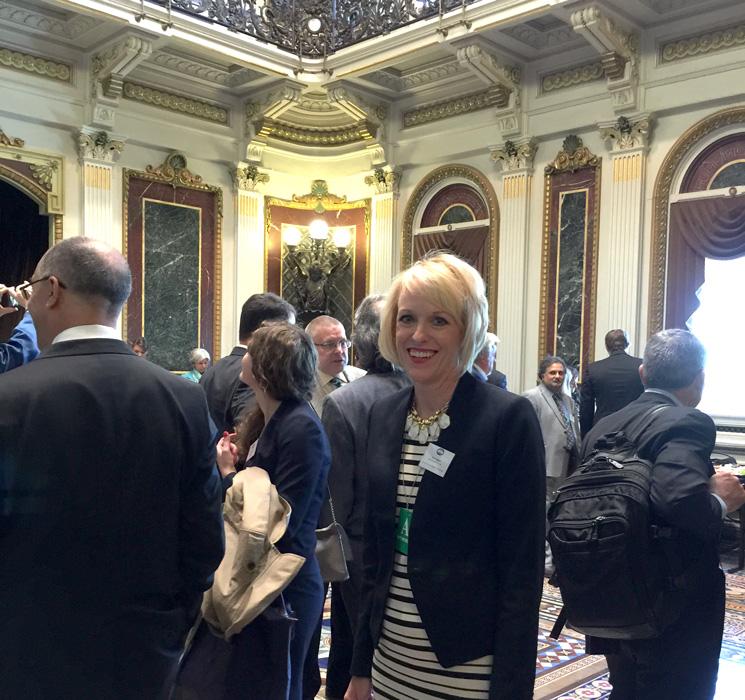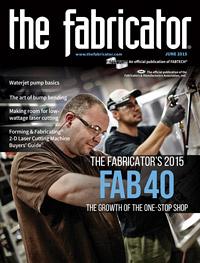- FMA
- The Fabricator
- FABTECH
- Canadian Metalworking
Categories
- Additive Manufacturing
- Aluminum Welding
- Arc Welding
- Assembly and Joining
- Automation and Robotics
- Bending and Forming
- Consumables
- Cutting and Weld Prep
- Electric Vehicles
- En Español
- Finishing
- Hydroforming
- Laser Cutting
- Laser Welding
- Machining
- Manufacturing Software
- Materials Handling
- Metals/Materials
- Oxyfuel Cutting
- Plasma Cutting
- Power Tools
- Punching and Other Holemaking
- Roll Forming
- Safety
- Sawing
- Shearing
- Shop Management
- Testing and Measuring
- Tube and Pipe Fabrication
- Tube and Pipe Production
- Waterjet Cutting
Industry Directory
Webcasts
Podcasts
FAB 40
Advertise
Subscribe
Account Login
Search
Upskilling – What it means and where it stands
An interview with Upskill Summit participant Traci Tapani
- By Vicki Bell
- June 3, 2015
- Article
- Shop Management
In April 2015 more than 100 U.S. companies that employ more than 5 million workers participated in the White House Upskill Summit to address the Upskill Initiative announced in President Obama's State of the Union address earlier this year. The president called on businesses to help workers of all ages earn a shot at better, higher-paying jobs, even if they do not have a higher education.
According to a Fact Sheet (www.whitehouse.gov/the-press-office/2015/04/24/fact-sheet-administration-announces-new-commitments-support-president-ob) published by the White House, the commitments announced at the summit already represent significant action and progress since the president's call to action. Among the actions are more on-the-job training and apprenticeship opportunities; increased uptake of training programs by building awareness and making it easier, cheaper, and faster to benefit from these opportunities; clarifying pathways to a promotion by articulating the skills better-paying jobs require and providing skill assessments; and working in partnership with government, unions, and philanthropy to expand the use of strategies like apprenticeships in new and growing fields.
Traci Tapani, co-president of Wyoming Machine, a family-owned business based in Stacy, Minn., was among the 100 employers invited to participate. She recently answered some questions from thefabricator.com about the summit and her participation.
thefabricator.com: How did you come to be invited to the Upskill Summit?
Tapani: A group called Business Leaders United (BLU) is part of the Upskill coalition, and they made me aware of this opportunity. Beyond that, it is not entirely clear, as the White House has not shared much information on how companies were selected. From what I understand from BLU, Wyoming Machine is and has been for some time developing its workforce in a way that is consistent with the Upskill Initiative. Rather than waiting for skilled workers to become available, we have started hiring some workers that don't have all of what we need and training them.
thefabricator.com: What did your participation entail?
Tapani: During the day there were breakout sessions in the following areas: (1) apprenticeship, (2) credentials, (3) education benefits, (4) mentorship and supportive services, and (5) on-the-job training.
I attended the breakout session on mentorship and supportive services. Each breakout session was responsible for coming up with (1) Big Bets, or innovative ideas for transformative change, (2) Quick Hits, or ideas that would produce immediate results, and (3) Selling the Idea, or ideas for how to engage others in the conversation.
After the breakout session each group presented to a panel of three people, which included Secretary of Commerce Penny Pritzker.
thefabricator.com: Do you think the initiative is important? Are you seeing the skills gap in your own shop?
Tapani: I think the initiative is extremely important. According to the information provided at the summit, the number of employees who receive on-the-job training has fallen dramatically, and this seems odd considering the trouble most employers are having with finding workers. The number of workers receiving employer-provided training has fallen from 21 to 12 percent since 1996.
I can't believe there isn't a manufacturer who doesn't see the skills gap. What separates one from another is what they are doing about it. Some are coming up with some really creative ideas for how to solve the problem.
thefabricator.com: Do you feel these national efforts are making a difference on the local level?
Tapani: I think the skills gap has to be addressed at the national level, but much of the day-to-day work is happening at the local level. As it relates to the Upskill America initiative, the federal government wants businesses to take the lead, but they want to know what policy changes they can make to help facilitate the process.
thefabricator.com: Were practical ideas presented for upskilling?
Tapani: Yes, there were definitely practical ideas. Businesses have made specific commitments to increasing apprenticeships; making it easier for their employees to access training; clarifying and communicating skills required to access better-paying jobs; and leveraging new technologies to make it easier for employees to access training.
I attended an optional morning breakfast that focused on technology that some industries are employing to help them upskill employees. One thing that people don't always understand is that adults face barriers that can make it difficult for them to access training outside of normal work hours. One thing that we have done at Wyoming Machine is to allow employees who are attending classes at a technical college to adjust their work schedules each quarter so that they can take the classes they need.
Sometimes transportation and child care can also hold people back. The more employers can help employees find solutions to these problems, the better chance people have of increasing their skills.
thefabricator.com: Have you put measures in place to upskill in your own shop? What are they, and how are they working out?
Tapani: Yes, we have put upskilling into practice in our shop. We have hired new employees from outside our industry and provided training to help them move into better-paying manufacturing jobs.
What we see is that employees from some industries not related to manufacturing actually have skills that are needed in our environment. We have leveraged the capabilities they bring to the job and then built upon them to increase their skills.
thefabricator.com: How do you feel the upskill message can best be delivered to a wider audience?
Tapani: I think that one of the most important things any of us can do is to tell our stories. Manufacturers that are already upskilling need to share their stories and let others know that they are finding solutions. Our entire industry can benefit if we can make this happen.
Have an upskilling story to share? E-mail me.
About the Author

Vicki Bell
2135 Point Blvd
Elgin, IL 60123
815-227-8209
subscribe now

The Fabricator is North America's leading magazine for the metal forming and fabricating industry. The magazine delivers the news, technical articles, and case histories that enable fabricators to do their jobs more efficiently. The Fabricator has served the industry since 1970.
start your free subscription- Stay connected from anywhere

Easily access valuable industry resources now with full access to the digital edition of The Fabricator.

Easily access valuable industry resources now with full access to the digital edition of The Welder.

Easily access valuable industry resources now with full access to the digital edition of The Tube and Pipe Journal.
- Podcasting
- Podcast:
- The Fabricator Podcast
- Published:
- 04/16/2024
- Running Time:
- 63:29
In this episode of The Fabricator Podcast, Caleb Chamberlain, co-founder and CEO of OSH Cut, discusses his company’s...
- Trending Articles
AI, machine learning, and the future of metal fabrication

Employee ownership: The best way to ensure engagement

Steel industry reacts to Nucor’s new weekly published HRC price

Dynamic Metal blossoms with each passing year

Metal fabrication management: A guide for new supervisors

- Industry Events
16th Annual Safety Conference
- April 30 - May 1, 2024
- Elgin,
Pipe and Tube Conference
- May 21 - 22, 2024
- Omaha, NE
World-Class Roll Forming Workshop
- June 5 - 6, 2024
- Louisville, KY
Advanced Laser Application Workshop
- June 25 - 27, 2024
- Novi, MI



























